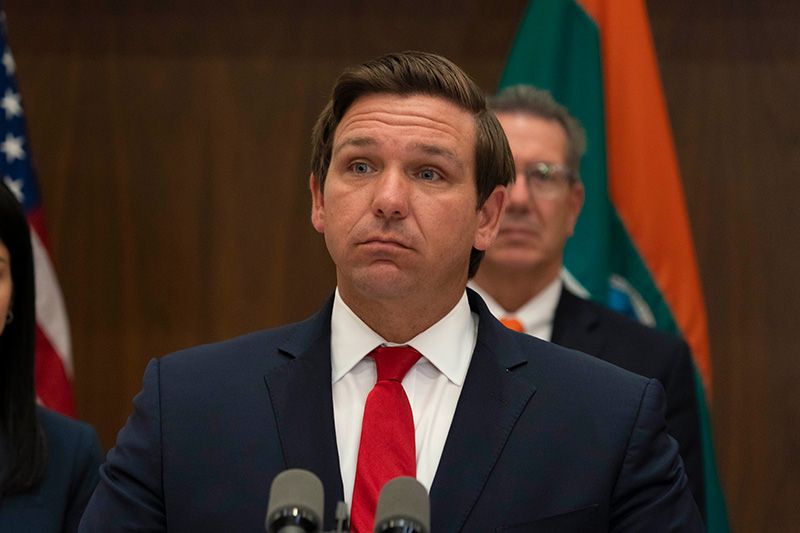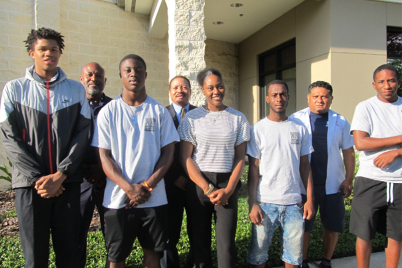The exchange of ideas and viewpoints should thrive in bastions of higher learning across the state, yet Ron DeSantis’ actions are only serving to hamstring the open discourse that is essential for us to truly understand one another.
BY FRANK DROUZAS, Staff Writer
In his crusade to rid the state educational system of any race discussion in the classroom, Gov. Ron DeSantis has fired his latest shot. His office recently requested state colleges’ data on courses and programs that include “diversity, equity and inclusion” and “critical race theory.”
In this recent memo, he asks that the State University System and Florida College System administrators document “the expenditure of state resources on programs and initiatives related to diversity, equity and inclusion, and critical race theory within our state colleges and universities.”
The official line from the memo is that DeSantis “has prioritized a cost-effective higher education system that delivers high-quality service to Floridians to best prepare them for employment. Additionally, state law requires dutiful attention to curriculum content at our higher education systems.”
I admit I’m going out on a rather sturdy limb here, but it seems like his zealous desire to prepare grads for employment is a smoke screen for the fact that he is trying to suppress the free and frank discussion of the race problem in colleges — precisely the places where this sort of thing should flourish.
Apparently, it was not enough to roll out his “Stop WOKE Act,” which would only serve to restrict certain race-based conversations in schools. Tallahassee U.S. District Judge Mark Walker blocked it, calling the act “positively dystopian” in its Orwellian squashing of free speech. He wrote: “If our ‘priests of democracy’ are not allowed to shed light on challenging ideas, then democracy will die in darkness.”
With this law — officially called, without a shred of intended irony, the Individual Freedom Act — the governor seeks to bar the teaching or business practices that maintain members of one ethnic group are inherently racist and should feel guilty for acts committed by others in the past. This Act also pushes the theory that because someone is of a certain race or gender, it does not necessarily follow that they are oppressed or privileged.
All this is to combat what DeSantis calls the “woke ideology.”
I have yet to come across a unilateral definition of “woke,” as no two people seem to agree on one. But is it “woke” to merely want to discuss race in the classroom openly? Is it “woke” to talk about our country’s very real and very brutal history of racism and oppression with hopes that students gain a better understanding of where we’ve been, so they can someday map out a better path for our nation in the future?
Is it “woke” to hold discourse on the slave auctions, the whippings, the lynchings, the marches, the sit-ins, the Civil Rights movement, and the change it brought about? Well, then, so be it. After all, how can we know where we’re going if we don’t know where we’ve been?
DeSantis has succeeded in part already, as university professors have been sufficiently scared into discarding certain classes on curriculums for fear that their universities will lose funding. Jonathan Cox, a Black sociology professor at the University of Central Florida, has recently scrapped two classes that would aim to explore racism — “Race and Social Media” and “Race and Ethnicity.” Though he has taught both courses before, Cox decided to cancel them just before the fall 2022 semester, stating that “it didn’t seem like it was worth the risk.”
To say this muzzling of our educators is dangerous is an understatement, and it’s hard not to feel that we are taking a mammoth step backward. Some textbooks for white schools in the South decades ago whitewashed history, claiming that enslaved people had a good time toiling away in the fields, as they even sang songs while they worked.
According to one book published over a century ago, “A Child’s History of North Carolina,” enslaved people “were allowed all the freedom they seemed to want and were given the privilege of visiting other plantations when they chose to do so. All that was required of them was to be in place when work time came, and at the holiday season, they were almost as free as their masters.”
Even recently, some right-wing textbooks have even referred to the enslavement of Black people in this country simply as “Black immigration.”
Anyone who believes this crazy revisionism was ever an acceptable way to teach students about our history is as close to reality as the Earth is to Alpha Centauri. Yet is not the squelching of honest discussion just as bad as the whitewashing?
If the Florida educational system keeps going down this path, the danger is that educators will be forced to avoid any discussions of the degradation, oppression and injustice that people of color have suffered in our country at the hands of the white populace.
How can we hold a dialogue about race issues if even talking about them is considered taboo? Worse, making this subject forbidden in classrooms may sew doubt in some students’ minds that this same degradation, oppression, and injustice ever really existed — or continues to exist.
DeSantis, like too many politicians these days, is so obsessed with finding a bugaboo to blame that he has zeroed in on critical race theory to shield our students from anything “woke,” hence these ridiculous, misguided attacks on the education system. The exchange of ideas and viewpoints should thrive in bastions of higher learning across the state, yet his actions are only serving to hamstring the open discourse that is essential for us to truly understand one another.









If I may, Mr. Drouzas, the problem that Governor DeSantis is rooting out is not the discussion of race, but the problem that schools across the country are having to deal with, and many continue to ignore- the concept of critical race theory, which digs up the mud and muck of past history and throws it on the descendants of those deemed “responsible” by a furious mob in the name of “social justice.” There is no cure for past wrongs. Yes, slavery was horrible, but it was abolished. If you want to talk about past wrongs of America, don’t blame them on the children of today. That’s what critical race theory does. It tells all “white” students, regardless of age- first grade or twelfth- that, because of their race, they are responsible for all of the wrongs done to African Americans, and that the only way to be a better person is to hate themselves for how inherently evil they are because they are “white”. Regardless of what wrong was done to people in the past, teaching children to hate themselves because of it should never be considered justified. Children are not responsible for this country’s past wrongs, and neither are we. It was before our time. All we can do is accept what was done, both for the good and the bad, and aim to prevent it from happening again.
Past history aside, “Diversity, Inclusion, and Equity” policy is a slap to the face of all those who have sought judgment by their own merits and not by the melanin of their epidermis. It serves as insult to those who spend years building up their resumes in colleges and universities, only to walk into an interview and find that the interviewer looks not at the almost half-centimeter-thick resume, but at a piece of paper, at a miniscule box-check, marked “Ethnicity.” I can say without a doubt that a self-respecting individual can feel very insulted when they spend the first five years of their adult life working harder for an education only to find that the same environment of skin-layer judgement, out of which they had to all but climb to escape, just reappeared on the other side of their first major job interview. It doesn’t matter if it’s turning you down for the job or giving it to you- it’s the same thing -you’re just on the giving end, this time, and not the receiving end. There is no such thing as equality in a world where no one is exactly the same. The closest we can approach equality is fair judgement based on hard work and merit. If you have any suggestions as to an alternative, please do speak up about it. Until then, please stop permitting the demonization of a paler skin condition under the guise of the “exchange of ideas and viewpoints” in public school classrooms.